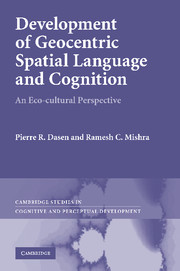Preface
Published online by Cambridge University Press: 02 December 2010
Summary
This book reports a cross-cultural study of child development in Indonesia (Bali), India, Nepal, and Switzerland, particularly in the area of spatial language and cognition. It examines a particular skill that is unfamiliar in Western contexts, which consists of using large-scale (“geocentric”) spatial directions such as north, south, east, and west (NSEW) when talking about the location of objects inside a room. Various ecological and socio-cultural conditions that favor the development of this skill are examined.
The geocentric spatial frame of reference (FoR) was first described and studied in anthropological linguistics by scholars at the Cognitive Anthropology Research Group (CARG) of the Max Planck Institute for Psycholinguistics in Nijmegen, the Netherlands. The findings are summarized in Levinson's (2003) book Space in language and cognition. This linguistic research, carried out through extensive field-work mainly with adults, examined over forty, mostly unwritten, languages spoken in small-scale, traditional societies, languages that favor a geocentric FoR. The argument is that when such a frame is used in language, it will also be used in non-linguistic cognition, such as memory and reasoning. Hence, Levinson (2003) and his group take a fairly strong “Whorfian” point of view of linguistic relativism.
One of us (P. Dasen) was made aware of this research in the early 1990s through Professor Jürg Wassmann, who had spent some time with Levinson's team, an anthropologist who was interested not only in cognitive anthropology (Wassmann, 1993a) but also in linking it to developmental psychology (Wassmann, 1988).
- Type
- Chapter
- Information
- Development of Geocentric Spatial Language and CognitionAn Eco-cultural Perspective, pp. xiv - xviiPublisher: Cambridge University PressPrint publication year: 2010

